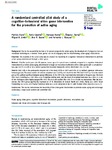A randomized controlled pilot study of a cognitive–behavioral video game intervention for the promotion of active aging

Use este enlace para citar
http://hdl.handle.net/2183/38780
Excepto si se señala otra cosa, la licencia del ítem se describe como Atribución-NoComercial-SinDerivadas 3.0 España
Colecciones
- Investigación (FEDU) [938]
Metadatos
Mostrar el registro completo del ítemTítulo
A randomized controlled pilot study of a cognitive–behavioral video game intervention for the promotion of active agingAutor(es)
Fecha
2024Cita bibliográfica
Otero, P., Cotardo, T., Blanco, V., Torres, Á. J., Simón, M. A., Bueno, A. M., & Vázquez, F. L. (2024). A randomized controlled pilot study of a cognitive–behavioral video game intervention for the promotion of active aging. Digital Health, 10. https://doi.org/10.1177/20552076241233139
Resumen
[Abstract] Background: Due to the accessibility barriers of in-person programs for active aging, the development of programs that use innovative technologies is needed. Video games can be an engaging tool for disseminating active aging interventions.
Objective: The objective of this pilot study was to analyze the feasibility of a cognitive–behavioral intervention to promote active aging administered through a video game.
Methods: Fifty-five participants (63.6% women, mean age =53.0 years) were randomly assigned to a cognitive–behavioral intervention to promote active aging administered through an interactive multimedia online video game with a complementary app (CBI-V; n=29) or to a control group that received nonspecific online information (CG; n=26).
Results: Only 3.6% of the participants dropped out of the study (6.9% in CBI-V and 0.0% in CG; without significant differences between groups). The mean number of modules completed was 7.6 (SD=0.9) out of 8 in the CBI-V and 7.9 (SD=0.5) in the control group (CG), without significant between-group differences. In the CBI-V, the mean total time dedicated to the game was 516.8 min (SD=94.3), including 143.2 min (SD=31.6) of cognitive training tasks, and the mean of completed tasks was 206.2 (SD=33.7) out of 259. Participants were highly engaged (M=39.9, SD=8.6) and satisfied (M=25.8, SD=4.5) with the intervention. After the intervention, the CBI-V group significantly improved on SF-36 dimensions of General Health (p=.0386), Vitality (p=.0283), Social Functioning (p=.0130), and Physical Summary Index (p=.0370) compared to the CG, with medium effect sizes (d=0.56–0.75).
Conclusions: The results demonstrate the feasibility of the video game intervention to promote active aging and encourage conducting a large-scale randomized controlled trial.
Palabras clave
Active aging
Video games
Cognitive–behavioral intervention
Graphic adventure
Smartphone app
Video games
Cognitive–behavioral intervention
Graphic adventure
Smartphone app
Versión del editor
Derechos
Atribución-NoComercial-SinDerivadas 3.0 España
ISSN
2055-2076






